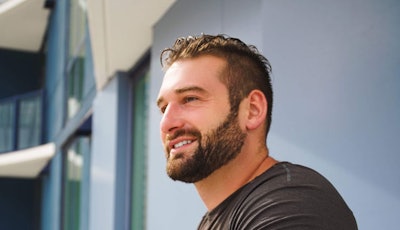
What were you doing you when you were 18? Studying? Partying? Staying up too late? Kyle Michaud was busy creating his first event company as an undergrad at the University at Albany, SUNY.
College is often a time for students to relive their early childhood by donning a costume and partying with friends. But sometimes it can be difficult to find a place on campus to celebrate. That inspired Michaud and his friends to get creative. They rented out a huge venue and 4,000 people attended.
This was Michaud’s first taste of being an event entrepreneur, so when it was time for him to venture into the meeting space after college, he was familiar with the industry and experienced at promoting events.
“Everything came easy because I used a lot of the same tips and tricks I used to promote the first events,” he said.
His solo foray into the industry was his first expo, The Green Planet Festival, which was inspired by his cold press juice company. The festival’s mission gave green-conscious consumers the opportunity to connect with green brands and sustainable services, he says.
Under his company, Experience Expositions—the world’s largest plant-based consumer festival company—he founded three expos. He has since sold two: Women Empower Expo (sold in 2017) and VegFest Expos (sold in 2018). The third, The Yoga Expo—a one-day event—is the golden goose of the company. It’s the largest yoga exposition in North America and had over 12,000 yogis attend in 2018.

Michaud shares more about sustainability practices, The Yoga Expo and the future of plant-based options for meetings.
What was your inspiration behind creating Experience Expositions?
The real mission was to connect like-minded customers with brands, products and services they would resonate with. I wanted to curate a community that went full circle, specifically for the yoga expo with teachers and students for products and services they can use for their everyday life.
How is sustainability incorporated into The Yoga Expo?
In regards to marketing, we are zero-carbon footprint and pride ourselves on that—and we don’t use flyers. Everything is online. So using social media, it’s great for us because we’re not using paper. We’re not distributing pamphlets. We use software that allows the attendees to do everything from their phone, including buying tickets. We don’t even have paper tickets.
I am a younger person in the industry and I think it adds value because people are using old tactics. And when you’re only doing one event a year, it’s hard to constantly change your approach. We only get one chance a year to change it.
What do you all do with the leftover food at The Yoga Expo?
Large-scale events are notorious for creating obscene amounts of waste from food and beverage offerings. We try to combat this issue at The Yoga Expo by having our entrees cooked on demand by four chefs that work at the event. This helps us avoid the excess waste of leftover pre-packaged meals.
What have you learned about attendees’ behavior at events as it relates to plant-based options?
I’ve been in meeting planning for six or seven years and see things evolve. People are becoming more, more receptive to it. And at the same time, these companies are investing in research and development, and I think people are starting to see the connection between a healthy life and a healthy diet. Now Burger King even has a plant-based burger.
What are actionable ways events can become greener and reduce their carbon footprint?
I think using more digital marketing. The schedules and the agendas are so important to be displayed at the event. A lot of venues now use LED monitors in the breakout rooms, which help because we don’t have to do big posters anymore and lists of sessions, times and speakers. By integrating that along with our messaging via mobile phone, I think that adds a lot of value in regards to sustainability.
Do the vendors at the event use paper materials, or do you all encourage them to not use it?
We don’t police them too much. But we try to be exclusive with our tote bags. We have recycled woven bags they can reuse. We try to educate our exhibitors. We have a best-practice guide we hand out before the event. And the vendors want to come on board too, in regards to sustainability, because they know that’s what attendees want.
What’s the future of plant-based options for the meetings industry?
I think there is so much to be done. We are constantly battling our venues, even with the in-house caterer that wants to supply soda, hot dogs and pretzels. We work with the chef in house at the venue to create a custom menu that’s catered to our attendees. So, delicious plant-based and chef-inspired meals have been a big step for us. If we choose a new venue, we work with referrals and work with the caterer to make a meal.



















